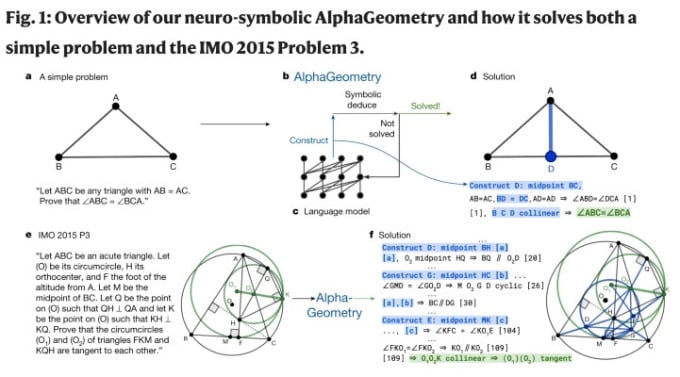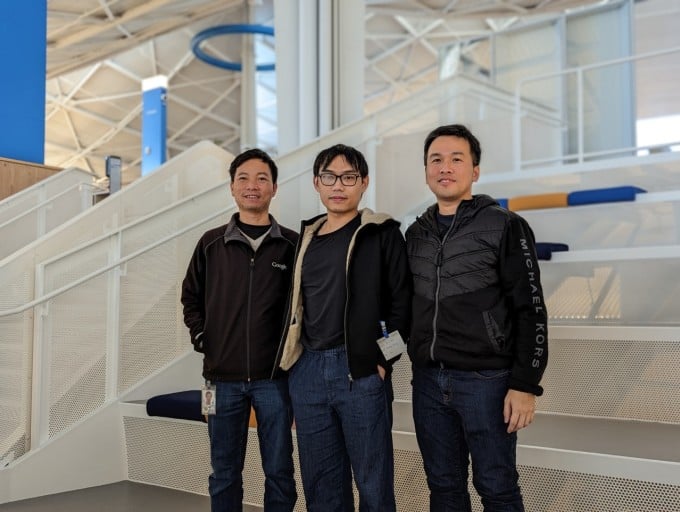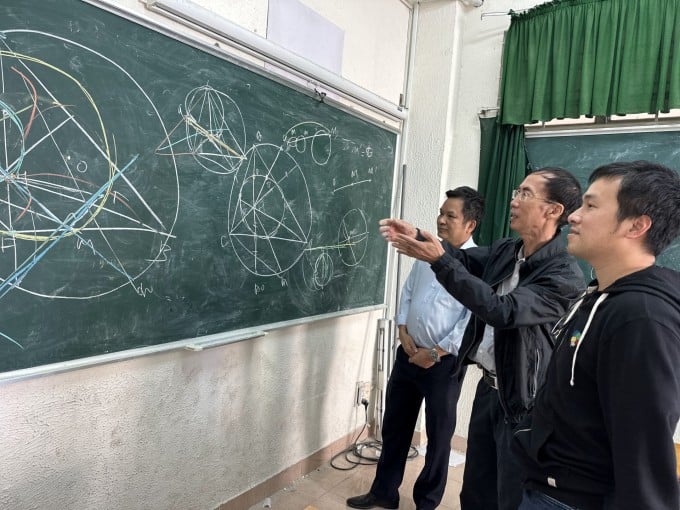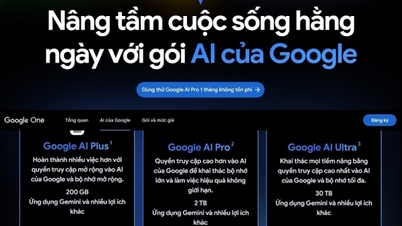The study was published in Nature, a prestigious scientific journal more than 150 years old, on January 17.
The main authors of AlphaGeometry are Trinh Hoang Trieu, 29, a PhD graduate from New York University, and Luong Minh Thang, 36, a PhD from Stanford University, USA. Accompanying Trieu and Thang are three other scientists, including Dr. Le Viet Quoc, 42, who is known as the "AI genius" at Google. Dr. Quoc and Thang are also senior experts at Google DeepMind, Google's artificial intelligence (AI) research department.
With 30 geometry problems in the International Mathematical Olympiad (IMO) 2000-2022 period, AlphaGeometry solved 25 problems in the prescribed time. Meanwhile, a previous advanced system solved only 10 problems, while an IMO gold medalist solved an average of 25.9 problems.
According to Google, each Olympiad has 6 problems, usually including 2 geometry problems, so AlphaGeometry can only handle 1/3 of the problems. If we only consider geometry, this AI is on par with the level of IMO gold medalists. And if we consider the total number of problems, this is the first AI model in the world that can surpass the bronze medal threshold of IMO 2000 and 2015.
Many AI experts and mathematicians consider this an impressive result.
“It makes perfect sense for AI researchers to try their hand at IMO geometry problems, because finding solutions to them is a bit like chess, in that we have very few reasonable moves at each step. But I’m still surprised they can do it,” said Professor Ngo Bao Chau.

Problem 3 of the IMO 2025 competition solved by AlphaGeometry. Photo: Provided by the character
AlphaGeometry combines a neural language model with good reasoning capabilities and a symbolic engine specialized in logical reasoning, which is then customized to understand geometry.
First, the neural network is trained on data, created algorithmically with 100 million examples of geometric proofs without using human solutions. When AlphaGeometry starts to solve a problem, the symbolic engine will start first. If it gets stuck, the neural network will suggest other ways to help.
This process is called “sub-pointing”, adding a line, bisecting an angle, drawing a sub-circle… just like how a human would solve a geometry problem. The loop continues until the answer is given or until the 4.5 hours, the time allotted for problems in the IMO exam, is up.
The special thing about this AI, according to the three PhDs, is that the input data is completely artificial. Trieu said that AlphaGeometry generates high-quality data, good enough to achieve a certain performance without training data from human solutions. This is something that other AI tools such as ChatGPT or Gemini have not been able to do.
"Simply put, AlphaGeometry generates solutions from nothing. Current AI models will search for available or similar human solutions," Dr. Thang shared.
The team also created a system, consisting of system 1 (fast, automatic, unconscious response) and system 2 (slow, logical) combined together. This is quite normal, but when combined with artificial data, it creates a breakthrough.

Three Vietnamese PhDs at Google DeepMind (from right to left): Le Viet Quoc, Trinh Hoang Trieu, Luong Minh Thang. Photo: Provided by the character
Trieu had the idea for AlphaGeometry in 2019, when he was looking for a topic for his graduate research at New York University.
"I think back to high school, I really liked doing geometry problems but wasn't good enough to take the national exam. So I decided to pursue it, initially just a model that could solve simple math problems," the Quy Nhon native recalled.
Originally students majoring in Mathematics at Quoc Hoc Hue High School and Gifted High School in Ho Chi Minh City, Quoc and Thang were quickly attracted to Trieu's idea. Trieu then joined Google DeepMind, working there since 2021.
By July 2022, after 10 versions, AlphaGeometry solved its first geometry problem. The team's breakthrough came three months later, when it solved a geometry problem at IMO.
According to Dr. Trieu, the AI created by the group can be used as a guidance system, supporting high school students in learning Geometry.
When testing, Evan Chen, a PhD student in Mathematics at MIT and the 2014 IMO gold medalist, was surprised at how effective this AI was. Chen said that usually a computer program solves geometry problems using coordinate systems and algebra, but AlphaGeometry uses pure geometric rules, with similar angles and triangles, just like students do.
“I was curious to know how AlphaGeometry was able to achieve this,” Chen said.

Dr. Le Ba Khanh Trinh (center) solves problem number 3 at IMO 2015. Photo: Wendy Nguyen
A month ago, when returning to the Gifted High School, Dr. Thang sent Dr. Le Ba Khanh Trinh the AI solution to problem number 3 at IMO 2015. This is one of the most difficult geometry problems in the IMO. AlphaGeometry gave the answer after 109 steps.
"Mr. Trinh was impressed because it solved using very simple rules, but he was not very satisfied because the solutions, according to him, must have soul, a certain beauty and must be connected to each other," Mr. Thang recounted. Dr. Trinh then used the inversion method, giving the result after about 20-30 steps. Mr. Trinh won the gold medal at the 1979 IMO with a perfect score, and was also the only Vietnamese person to win a special prize at an IMO competition, with a beautiful and concise solution to a geometry problem.
The team says this could be a way to continue improving AlphaGeometry. They also hope that the next steps of this AI can help humans solve the 7 Millennium Problems.
This is what Dr. Le Viet Quoc once thought was an "impossible prospect", because AI can solve one-step problems very well, but mathematical problems often have hundreds of steps.
The "AI genius" at Google said he was proud that the research of Vietnamese engineers was published in Nature - the most prestigious international journal. According to him, AI can solve mathematical problems and push humanity forward.
"Because mathematics is the language of science and technology. Doing math is the way to promote the development of these fields," said Mr. Quoc.
Doan Hung


![[Photo] General Secretary To Lam, Secretary of the Central Military Commission attends the 12th Party Congress of the Army](https://vphoto.vietnam.vn/thumb/1200x675/vietnam/resource/IMAGE/2025/9/30/9b63aaa37ddb472ead84e3870a8ae825)
![[Photo] Panorama of the cable-stayed bridge, the final bottleneck of the Ben Luc-Long Thanh expressway](https://vphoto.vietnam.vn/thumb/1200x675/vietnam/resource/IMAGE/2025/9/30/391fdf21025541d6b2f092e49a17243f)
![[Photo] The 1st Congress of Phu Tho Provincial Party Committee, term 2025-2030](https://vphoto.vietnam.vn/thumb/1200x675/vietnam/resource/IMAGE/2025/9/30/1507da06216649bba8a1ce6251816820)
![[Photo] President Luong Cuong receives President of the Cuban National Assembly Esteban Lazo Hernandez](https://vphoto.vietnam.vn/thumb/1200x675/vietnam/resource/IMAGE/2025/9/30/4d38932911c24f6ea1936252bd5427fa)
![[Photo] Solemn opening of the 12th Military Party Congress for the 2025-2030 term](https://vphoto.vietnam.vn/thumb/1200x675/vietnam/resource/IMAGE/2025/9/30/2cd383b3130d41a1a4b5ace0d5eb989d)


































































































Comment (0)